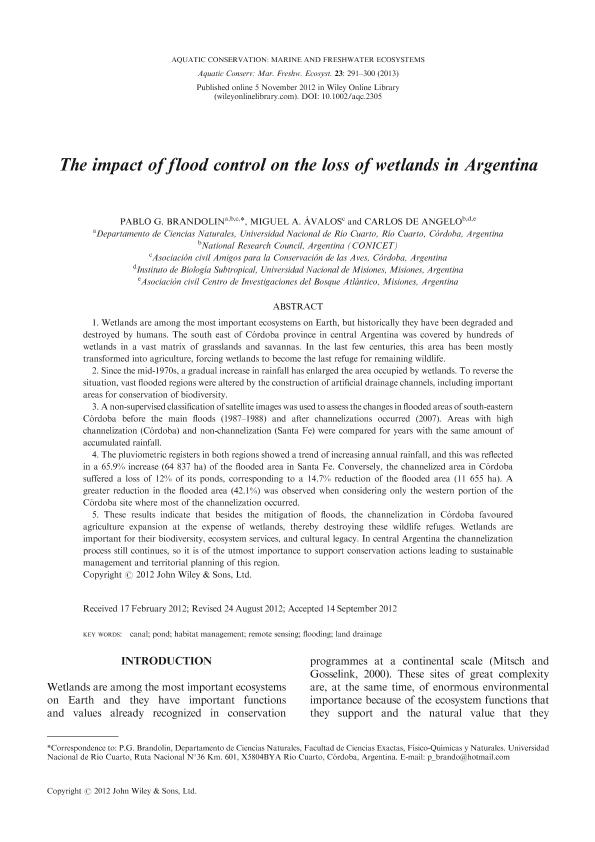Mostrar el registro sencillo del ítem
dc.contributor.author
Brandolin, Pablo Germán

dc.contributor.author
Ávalos, Miguel A.
dc.contributor.author
de Angelo, Carlos Daniel

dc.date.available
2016-12-01T14:56:23Z
dc.date.issued
2012-11
dc.identifier.citation
Brandolin, Pablo Germán; Ávalos, Miguel A.; de Angelo, Carlos Daniel; The impact of flood control on the loss of wetlands in Argentina; John Wiley & Sons Ltd; Aquatic Conservation: Marine and Freshwater Ecosystems; 23; 2; 11-2012; 291-300
dc.identifier.issn
1052-7613
dc.identifier.uri
http://hdl.handle.net/11336/8563
dc.description.abstract
1. Wetlands are among the most important ecosystems on Earth, but historically they have been degraded and destroyed by humans. The south east of Córdoba province in central Argentina was covered by hundreds of wetlands in a vast matrix of grasslands and savannas. In the last few centuries, this area has been mostly transformed into agriculture, forcing wetlands to become the last refuge for remaining wildlife. 2. Since the mid-1970s, a gradual increase in rainfall has enlarged the area occupied by wetlands. To reverse the situation, vast flooded regions were altered by the construction of artificial drainage channels, including important areas for conservation of biodiversity. 3. A non-supervised classification of satellite images was used to assess the changes in flooded areas of south-eastern Córdoba before the main floods (1987?1988) and after channelizations occurred (2007). Areas with high channelization (Córdoba) and non-channelization (Santa Fe) were compared for years with the same amount of accumulated rainfall. 4. The pluviometric registers in both regions showed a trend of increasing annual rainfall, and this was reflected in a 65.9% increase (64 837 ha) of the flooded area in Santa Fe. Conversely, the channelized area in Córdoba suffered a loss of 12% of its ponds, corresponding to a 14.7% reduction of the flooded area (11 655 ha). A greater reduction in the flooded area (42.1%) was observed when considering only the western portion of the Córdoba site where most of the channelization occurred. 5. These results indicate that besides the mitigation of floods, the channelization in Córdoba favoured agriculture expansion at the expense of wetlands, thereby destroying these wildlife refuges. Wetlands are important for their biodiversity, ecosystem services, and cultural legacy. In central Argentina the channelization process still continues, so it is of the utmost importance to support conservation actions leading to sustainable management and territorial planning of this region.
dc.format
application/pdf
dc.language.iso
eng
dc.publisher
John Wiley & Sons Ltd

dc.rights
info:eu-repo/semantics/openAccess
dc.rights.uri
https://creativecommons.org/licenses/by-nc-sa/2.5/ar/
dc.subject
Canal
dc.subject
Pond
dc.subject
Habitat Management
dc.subject
Remote Sensing
dc.subject
Flooding
dc.subject
Land Drainage
dc.subject.classification
Conservación de la Biodiversidad

dc.subject.classification
Ciencias Biológicas

dc.subject.classification
CIENCIAS NATURALES Y EXACTAS

dc.title
The impact of flood control on the loss of wetlands in Argentina
dc.type
info:eu-repo/semantics/article
dc.type
info:ar-repo/semantics/artículo
dc.type
info:eu-repo/semantics/publishedVersion
dc.date.updated
2016-11-23T18:17:39Z
dc.identifier.eissn
1099-0755
dc.journal.volume
23
dc.journal.number
2
dc.journal.pagination
291-300
dc.journal.pais
Reino Unido

dc.journal.ciudad
Londres
dc.description.fil
Fil: Brandolin, Pablo Germán. Universidad Nacional de Rio Cuarto. Facultad de Cs.exactas Fisicoquimicas y Naturales. Departamento de Cs.naturales. Catedra de Zoologia de Vertebrados; Argentina. Consejo Nacional de Investigaciones Científicas y Técnicas; Argentina. Asociación civil Amigos para la Conservación de las Aves, Córdoba; Argentina
dc.description.fil
Fil: Ávalos, Miguel A.. Asociación civil Amigos para la Conservación de las Aves, Córdoba; Argentina
dc.description.fil
Fil: de Angelo, Carlos Daniel. Universidad Nacional de Misiones. Facultad de Ciencias Forestales. Instituto de Biologia Subtropical - Sede Puerto Iguazu; Argentina. Asociación civil Centro de Investigaciones del Bosque Atlántico, Misiones; Argentina. Consejo Nacional de Investigaciones Científicas y Técnicas; Argentina
dc.journal.title
Aquatic Conservation: Marine and Freshwater Ecosystems

dc.relation.alternativeid
info:eu-repo/semantics/altIdentifier/doi/https://dx.doi.org/10.1002/aqc.2305
dc.relation.alternativeid
info:eu-repo/semantics/altIdentifier/url/http://onlinelibrary.wiley.com/doi/10.1002/aqc.2305/abstract
Archivos asociados
